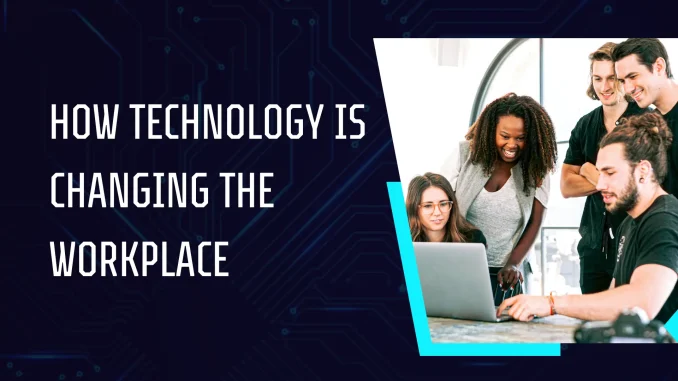
The future of work is unfolding rapidly, driven by technological advancements that are reshaping how we work, interact, and thrive in professional environments. From the rise of artificial intelligence (AI) and automation to the evolution of remote work and digital collaboration, technology is transforming every aspect of the workplace. Understanding these changes and their implications is crucial for employees, employers, and policymakers alike as we navigate this new era of work.
The Technological Revolution in the Workplace
Technology has always been a driver of change in the workplace, but recent developments have accelerated this transformation. Key technological trends shaping the future of work include:
- Artificial Intelligence and Automation: AI and automation are at the forefront of workplace transformation. AI algorithms can analyze vast amounts of data, automate repetitive tasks, and provide valuable insights for decision-making. Automation, powered by robotics and machine learning, is streamlining processes in manufacturing, logistics, and service industries. These technologies enhance efficiency but also raise questions about job displacement and the future role of human workers.
- Remote Work and Digital Collaboration: The COVID-19 pandemic accelerated the adoption of remote work, highlighting the potential of digital tools for collaboration. Platforms like Zoom, Microsoft Teams, and Slack have become essential for virtual meetings and teamwork. Remote work offers flexibility and access to a global talent pool, but it also presents challenges related to work-life balance, employee engagement, and cybersecurity.
- Cloud Computing and Data Analytics: Cloud computing enables organizations to store and access data and applications over the internet, reducing the need for physical infrastructure. Coupled with advanced data analytics, cloud technology allows companies to gain insights into customer behavior, optimize operations, and drive innovation. Data-driven decision-making is becoming a cornerstone of competitive advantage.
- Virtual and Augmented Reality: Virtual reality (VR) and augmented reality (AR) are transforming training, design, and collaboration. VR creates immersive simulations for employee training, while AR overlays digital information onto the physical world, enhancing productivity and precision. These technologies are finding applications in industries such as healthcare, real estate, and engineering.
- Internet of Things (IoT): IoT connects devices and systems through the internet, enabling real-time monitoring and control. In the workplace, IoT can optimize resource management, improve facility maintenance, and enhance employee safety. Smart office environments, equipped with sensors and automated systems, are becoming more common.
Implications for the Workforce
As technology reshapes the workplace, its impact on the workforce is profound and multifaceted:
- Job Displacement and Creation: While automation and AI may displace certain jobs, they also create new opportunities. Roles in tech support, data analysis, and AI development are on the rise. Reskilling and upskilling initiatives are essential for helping workers transition to new roles and adapt to changing job requirements.
- Changing Skills and Competencies: The demand for digital literacy, technical skills, and soft skills is increasing. Employees need to be proficient in using digital tools, understanding data, and collaborating effectively in virtual environments. Skills such as problem-solving, creativity, and emotional intelligence are becoming increasingly valuable in a technology-driven workplace.
- Work-Life Balance and Flexibility: Technology enables greater flexibility in work arrangements, such as remote work and flexible hours. However, it also blurs the boundaries between work and personal life, leading to potential challenges in maintaining work-life balance. Employers and employees must find ways to manage these boundaries to prevent burnout and ensure well-being.
- Workplace Culture and Collaboration: Technology is transforming workplace culture by enabling new forms of collaboration and communication. Virtual teams and digital interactions require a shift in how relationships are built and maintained. Companies need to foster inclusive and supportive cultures that leverage technology while addressing the challenges of remote and hybrid work environments.
- Ethical and Privacy Concerns: The use of technology in the workplace raises ethical and privacy issues. Employers must navigate concerns related to employee surveillance, data privacy, and the responsible use of AI. Transparent policies and practices are essential for building trust and ensuring ethical technology deployment.
Preparing for the Future of Work
To navigate the evolving workplace landscape, organizations and individuals must proactively prepare for the future:
- Embrace Lifelong Learning: Continuous learning and professional development are crucial for staying relevant in a technology-driven world. Employees should seek opportunities for reskilling and upskilling, while employers should invest in training programs that align with emerging technologies and industry trends.
- Foster a Culture of Innovation: Organizations should cultivate a culture that encourages experimentation and innovation. Embracing new technologies and adapting to change can drive competitive advantage and improve organizational resilience.
- Invest in Technology and Infrastructure: Companies need to invest in the right technology and infrastructure to support remote work, digital collaboration, and data management. Ensuring that systems are secure, reliable, and scalable is essential for maintaining productivity and efficiency.
- Focus on Employee Well-Being: Addressing the challenges of remote work and digital overload requires a focus on employee well-being. Organizations should implement policies that support work-life balance, mental health, and professional growth.
- Engage in Ethical Practices: Ethical considerations should be at the forefront of technology adoption and deployment. Companies must establish clear guidelines for data privacy, employee monitoring, and the responsible use of AI to ensure that technology benefits all stakeholders.
Leave a Reply